Methane International
The Global Methane Initiative Update
Issue 26, November 2011
Partnership-Wide Meeting a Success!
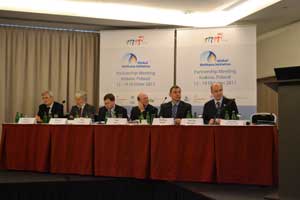
Dignitaries from the opening plenary session.
In October 2011, more than 160 Partner Country representatives, government leaders, and technical experts from 31 countries gathered in historic Krakow, Poland, for the Global Methane Initiative's (GMI's) Partnership-wide meeting. The meeting began with site tours offered in the Initiatives' four sectors of interest—agriculture, coal, landfill, and oil and gas—as well as a reception and tour of World Heritage Site Wieliczka Salt Mine.
The next day, Marcin Korolec, Undersecretary of State with Poland's Ministry of Economy, welcomed attendees to the informational sessions. He emphasized the importance of methane as a clean energy source and how GMI provides an excellent platform for international cooperation. Also part of the opening session was William Heidt, Deputy Chief of Mission at the U.S. Embassy; Paul Gunning, Acting Director, U.S. Environmental Protection Agency (EPA) Climate Change Division; Håvard Toresen, Deputy Director General from Norway's Ministry of the Environment, GMI's newest Partner Country (see below); and Zbigniew Kamienski, Deputy Director from Poland's Ministry of Economy.
Other items covered during the meeting included the announcement of a fifth subcommittee, the Municipal Wastewater Subcommittee. Partner Country delegates are encouraged to email the ASG to nominate a representative to be involved with the new subcommittee. ASG also announced that Canada will host the 2013 GMI Expo and planning is already underway. The 2013 GMI Expo will be held in Vancouver, a scenic coastal seaport city in British Columbia.
Updates and highlights from each sector are listed below.
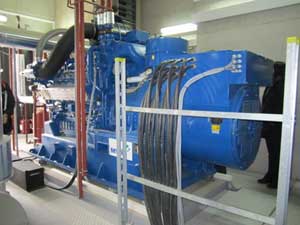
MWM's 600 kilowatt engine at the National Research Institute of Animal Production.
Agriculture
The agricultural sector activities included a site visit, technical sessions, and a subcommittee meeting. Nearly 20 participants went to Grodziec Slaski, where they toured an agricultural anaerobic digestion (AD) system at the National Research Institute of Animal Production. At the Institute, manure from cows and hogs is processed along with waste from an ethanol plant in an onsite AD system.
The agricultural technical session covered financing options for project development, an overview of national standards and policies that increase the adoption of AD, and highlights on AD projects from around the globe. The technical sessions also included a discussion on international collaboration helping to make AD projects operational and successful.
The Agriculture Subcommittee meeting included Partner Country updates from GMI representatives from Argentina, Canada, India, Poland, Thailand, and the United States. Updates were also provided by Project Network members on AD projects in Ethiopia, Germany, Pakistan, and the United Kingdom. The meeting also included an update on the status of the international AD database, which will be used to track information about AD projects in GMI Partner Countries. The ASG is asking people to submit data for it in an Excel template (XLS, 178K). Please review the glossary (PDF, 6 pp, 107K) for assistance in filling out the template.
Additional subcommittee items discussed included subcommittee leadership with the suggestion that the United States participate as a Co-Chair, the development of a simple tool to estimate methane emissions from farms, and topics for the 2013 GMI Expo. (Suggestions for Expo topics are welcome and should be sent to the ASG.)
Coal Mines
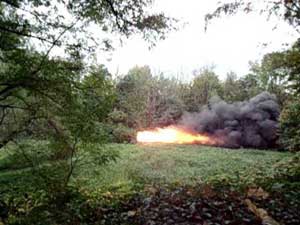
Coal dust explosion at the experimental mine "Barbara."
Activities for the coal mines sector included a site tour, a subcommittee meeting, and technical breakout sessions. Twenty-five participants from 14 countries traveled to the Central Mining Institute of Katowice's experimental mine "Barbara," where researchers discussed their work in improving mine safety. They demonstrated the potential impact of a coal dust explosion by conducting a real explosion in their test mine. Following this visit, participants visited Jastrzębska Spółka Węglowa S.A.'s "Pniowek" hard coal mine, where coal mine methane (CMM) is recovered and utilized in a 10 megawatt (MW) electric power project and evaporative cooling system.
The breakout sessions covered best practices for CMM drainage and utilization, new and developing CMM technologies, discussions on unique methane sources from surface mines and ventilation air methane, an introduction to Australia's Clean Energy Future package and Coal Sector Assistance package, and an overview of CMM activities in Poland. Perspectives on best practices, technologies, sources, policy, and project development were provided by representatives from several countries, including Australia, Canada, the Netherlands, Poland, Russia, Switzerland, the United Kingdom, and the United States.
The Coal Mine Subcommittee meeting focused on discussing a draft policy paper to respond to the Steering Committee's discussion regarding the potential impacts of expanding the Initiative to include methane abatement and flaring. The draft paper noted that the first priority for CMM projects would be to recover and utilize the methane, but flaring may be an appropriate abatement strategy in some cases. In addition, Partner Country delegates and Project Network members also discussed the draft CMM technology database, and noted that it would be a living document to store information about emerging technologies and businesses in the sector. Additionally, representatives from Partner Countries, including acting Co-Chairs from China and India, shared updates related to CMM activities.
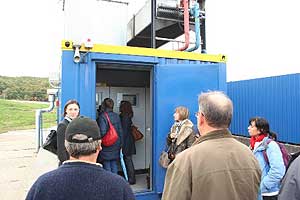
Attendees at the "Barycz" Landfill's integrated solid waste management facility.
Landfills
On 12 October, more than 35 attendees visited the "Barycz" Landfill outside of Krakow to see a state-of-the-art integrated solid waste management facility. The landfill hosts one of over 80 new landfill gas (LFG) energy projects that came online or under construction over the last five years in Poland due, in large part to a favorable green pricing tariff. The LFG energy project generates 1.3 MW using four internal combustion engines. The landfill also contains an innovative green waste composting facility and sophisticated waste sorting plant where recyclable materials are recovered and sold for reuse.
Breakout sessions for the landfill sector were well attended, with more than 35 people at each session. The first session focused on the transition from Methane to Markets to GMI's expanded scope and included topics on methane avoidance, lessons learned from integrated solid waste management strategies in Europe, and new incentives to promote clean energy. A session on the importance of waste management in Nationally Appropriate Mitigation Actions (NAMAs) and the role of GMI in these efforts was presented by GMI Partners Colombia and Serbia. The third session focused on technical and financial factors in the development and operation of LFG and wastewater energy projects, including an innovative leachate treatment system that may be suitable for application in GMI Partner Countries. The final session focused on the challenges and opportunities for advancing LFG energy in Poland by two of the hosts – the Oil and Gas Institute and the Ministry of Environment.
The Landfill Subcommittee meeting discussed activities for the remainder of 2011, such as the finalization and distribution of an international LFG best practices guide. Based on charges from the Steering Committee, they discussed modifying the Landfill Subcommittee name to reflect the new expanded scope, developing longer-term planning goals, and forming a taskforce to assist with planning for the 2013 GMI Expo, including developing technical content and project ideas.
Oil & Gas Systems
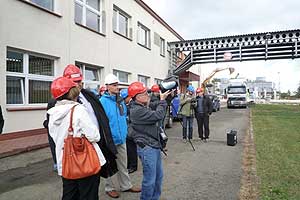
Tour site attendees receive live demonstration of infrared cameras (leak detection equipment) at the Gaz-System's Compressor Station in Pogórska Wola.
The oil & gas systems sector meeting included a site tour and technical breakout sessions. The site tour, attended by nearly 30 participants, was hosted by Gaz-System at their compressor station and laboratory in Pogórska Wola. The tour started with a review of gas quality, which was followed by noise and vibration measurements and a demonstration of FLIR and OPGAL infrared cameras. The tour concluded with presentations on the results of Gaz-System's methane emission measurement study.
The technical breakout sessions addressed a variety of topics, including:
- Gaz-System's testing of methane identification and measurement equipment;
- India's Oil and Natural Gas
Company (ONGC)
 implementation of vapor recovery units on crude oil tanks;
implementation of vapor recovery units on crude oil tanks; - Indonesian climate policy and the importance of methane reductions in the oil & gas sector;
- Experiences with methane leak detection and measurement studies from the service provider and corporate perspective;
- BP's use of reduced emission completions to minimize methane emissions from hydraulically fractured gas wells;
- Open Grid Europe's experience using pipeline pump down to minimize methane emissions during transmission pipeline repair; and
- BP's experience routing centrifugal compressor seal oil de-gassing emissions to fuel gas as an alternative to installing dry seals.
In all of these sessions, the presenters and participants discussed the importance of emission detection and measurement. This included its broad importance with benefits extending beyond conserving natural gas resource, but also to employee and public safety, operating efficiencies and integrity, corporate image, and making positive contributions to the global environment.
GMI Welcomes Two New Partner Countries
 In
October 2011, GMI welcomed its newest Partner Country, Sri Lanka.
Delegates from Sri Lanka will join the Agriculture and Landfill Subcommittees as
well as the new Municipal Wastewater Subcommittee. With its mostly rural population,
Sri Lanka plans to expand its development of small- and medium-scale biogas digesters
and share its experience with AD system design standards. The country is also interested
in implementing projects to reduce methane emissions as they transition to sanitary
landfills. By 2020, Sri Lanka aims to achieve a 20 percent contribution from renewable
sources, as established by the country's Renewable Energy Policy.
In
October 2011, GMI welcomed its newest Partner Country, Sri Lanka.
Delegates from Sri Lanka will join the Agriculture and Landfill Subcommittees as
well as the new Municipal Wastewater Subcommittee. With its mostly rural population,
Sri Lanka plans to expand its development of small- and medium-scale biogas digesters
and share its experience with AD system design standards. The country is also interested
in implementing projects to reduce methane emissions as they transition to sanitary
landfills. By 2020, Sri Lanka aims to achieve a 20 percent contribution from renewable
sources, as established by the country's Renewable Energy Policy.
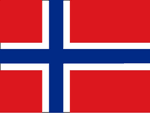 On
12 October 2011, during the GMI Partnership-wide meeting, the Steering Committee
approved Norway's request to join GMI. Norway will join 40 other
Partner Countries. Delegates from Norway will join the Oil & Gas Subcommittee.
Norway has experience and opportunities for methane capture and use projects in
the oil and gas sector and is looking forward to collaborating with other GMI Partner
Countries.
On
12 October 2011, during the GMI Partnership-wide meeting, the Steering Committee
approved Norway's request to join GMI. Norway will join 40 other
Partner Countries. Delegates from Norway will join the Oil & Gas Subcommittee.
Norway has experience and opportunities for methane capture and use projects in
the oil and gas sector and is looking forward to collaborating with other GMI Partner
Countries.
Based on data from the U.S. EPA's Global Anthropogenic Emissions of Non-CO2 Greenhouse Gases (PDF, 274 pp, 4 MB) report, Norway's 2010 estimated anthropogenic methane emissions totaled 5.4 million metric tons of carbon dioxide equivalent (MMTCO2E). Methane emissions from natural gas and oil systems represent more than 12 percent of Norway's anthropogenic methane emissions—0.67 MMTCO2E.
2011 Grant Solicitation Issued
The U.S. EPA has announced its new
2011 request for proposals
 to fund projects that will advance the abatement, recovery, and use of methane as
a clean energy source. Successful proposals will support the Initiative's Action
Plans and advance project development in the GMI Partner Countries.
to fund projects that will advance the abatement, recovery, and use of methane as
a clean energy source. Successful proposals will support the Initiative's Action
Plans and advance project development in the GMI Partner Countries.
The total estimated amount for this competitive funding opportunity is $5 million. EPA expects to award up to thirty-five cooperative agreements through this announcement, ranging from $100,000 to $750,000 per award. The project period for awards resulting from this solicitation will begin in January 2012. Proposed project periods may be up to three years.
Applications must be received no later than 19 January 2012, 4:00 p.m. EST.
GMI Outreach
Highlighted below are recent outreach events and workshops.
August
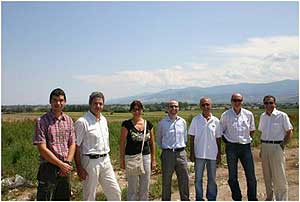
Tom Frankiewicz, of the U.S. EPA's LMOP, at the Plovdiv Landfill with representatives from the Municipality of Plovdiv.
Tom Frankiewicz, of the U.S. EPA's Landfill Methane Outreach Program (LMOP), traveled to Bulgaria to meet with representatives from Partner organization Bulgaria's Ministry of Environment and Water. During the meeting representatives shared information on the implementation of a National Solid Waste Management Program, including the role of waste sector mitigation and abatement activities, as well as provided an update on the status of over 28 new regional solid waste management facilities throughout Bulgaria. A second meeting took place with Bulgaria's Municipality of Plovdiv, which included a site visit to Tsalapitsa Landfill. GMI is conducting an LFG assessment study at the site. The visit also included a tour of a landfill in Bourgas to assess the current practices in order to determine if an LFG energy project might be a good fit for the landfill.
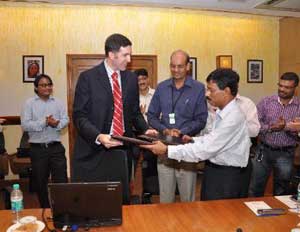
Scott Bartos, from U.S. EPA's Natural Gas STAR Program, with contacts from GAIL (India) Limited.
Scott Bartos, from U.S. EPA's Natural Gas STAR Program, traveled to India
to talk with companies about working collaboratively to reduce methane emissions.
As part of his trip he met with representatives from
GAIL (India) Limited
 - a state-owned natural gas processing and distribution company headquartered in
New Delhi. GAIL has subsequently agreed to join the Natural Gas STAR International
Program. By doing so, they have committed to research and implement cost-effective
technologies and operation and maintenance strategies to reduce methane emissions.
- a state-owned natural gas processing and distribution company headquartered in
New Delhi. GAIL has subsequently agreed to join the Natural Gas STAR International
Program. By doing so, they have committed to research and implement cost-effective
technologies and operation and maintenance strategies to reduce methane emissions.
September
GMI co-hosted the Serbia Landfill Biogas Workshop in collaboration with Serbia's Ministry of Environment, Mining and Spatial Planning and the Faculty of Technical Sciences at the University of Novi Sad. Presentations covered GMI activities, Serbia's Methane Action Plan, and LFG project considerations and modeling efforts, as well as guidance on project approval and financing. For more information, including the agenda, visit GMI's website.
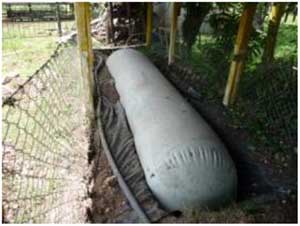
Peruvian digester, consists of a single bag, and is one style of AD systems used in Nicaragua.
Allison Costa, with U.S. EPA's AgSTAR Program, traveled to Nicaragua to meet with representatives from Partner organization Nicaragua's Ministry of Energy and Mines. Nicaragua is dedicated to reducing methane emissions as well as increasing the amount of energy provided by renewable sources and increasing energy efficiency. The country has recently completed an action plan for their landfill sector and is now interested in working on their agriculture sector action plan. The development of the landfill action plan is being used as a model to create the agriculture action plan. The development for each was initiated by Julio C. Perez Aguilar from Nicaragua's Ministry of Energy and Mines. For the landfill action plan, Mr. Aguilar convened a group of stakeholders across the industry to get their feedback on the plan, which was seen as such a great opportunity to learn and network from each other that the group intends to continue its meetings. The goal is to achieve a similar, successful outcome with the stakeholder group for an agricultural sector action plan. The visit also included tours at two farms that do not have AD systems, but are interested in pursuing the option of implementing an AD system.
GMI participated in the 22nd World Mining Congress and Expo in Istanbul, Turkey.
At the conference, GMI provided an overview of sources of CMM, the potential for
its capture and reuse for energy use, and examples of project development and financing,
as well as opportunities within Turkey. More information, including photos, can
be found on the Expo's
website
 .
.
GMI attended the
7th International Conference on Biomass for Energy
 in Kiev, Ukraine. This two-day conference promoted the use of biomass
as an energy source in Ukraine and consisted of multiple workshops. GMI sponsored
a workshop (PDF,
1 pg, 58K) entitled "Landfill Gas Collection and Utilization at Ukrainian MSW
Landfills: First Results, Problems, and Prospects" and made two presentations
during the workshop. The presentations were entitled Landfill Gas Collection System
Design and Operational Considerations and Considerations for Municipalities
before Issuing Tenders for Landfill Biogas Projects. For more information,
visit GMI's website.
in Kiev, Ukraine. This two-day conference promoted the use of biomass
as an energy source in Ukraine and consisted of multiple workshops. GMI sponsored
a workshop (PDF,
1 pg, 58K) entitled "Landfill Gas Collection and Utilization at Ukrainian MSW
Landfills: First Results, Problems, and Prospects" and made two presentations
during the workshop. The presentations were entitled Landfill Gas Collection System
Design and Operational Considerations and Considerations for Municipalities
before Issuing Tenders for Landfill Biogas Projects. For more information,
visit GMI's website.
GMI attended a Seminar on State-of-the-Art Coal Mine Methane Capture and Use Technologies and UNECE Best Practices Guidance for Effective Methane Drainage and Use Workshop in Donetsk, Ukraine. The two-day event was attended by nearly 100 participants and brought together key experts in CMM recovery and utilization to share information about modern drilling, ventilation air methane oxidation technologies, and methane concentration systems. Felicia Ruiz of the U.S. EPA's Coalbed Methane Outreach Program (CMOP), along with the Deputy Minister of Energy and Coal Industry of Ukraine, provided the keynote speeches. For more information, including presentations, visit GMI's website.
GMI hosted its first Asia Pacific Global Methane Initiative Oil and Gas Sector Workshop in Jakarta, Indonesia. This workshop included a discussion of ways to reduce methane emissions from oil and gas facilities as well as provided a demonstration of infrared camera detection of methane emissions and venting. GMI presented Partnering to Advance Clean Energy Development & Climate Protection – The Global Methane Initiative as well as provided the closing remarks. Visit the workshop's Web page for additional information.
GMI attended two events in Mexico. The first was a technical, policy,
and science workshop organized by Mexico's National Institute of Ecology. Approximately
70 people attended the workshop, which focused on the science, sources, mitigation
opportunities, financing mechanisms, and existing international initiatives associated
with short-lived climate forcers (SLCFs) such as methane and black carbon. Henry
Ferland, ASG Co-Director, provided an overview of GMI during the workshop. The second
event was a high-level Ministerial meeting organized by the U.S. State Department,
along with government agencies in Canada, Mexico,
and Sweden, and was attended by representatives from 22 countries.
The meeting focused on the importance of SLCFs and discussed the development of
a new initiative that would be complementary to the
United Nations Framework Convention on Climate Change
 to increase existing international efforts focused on reducing SLCFs.
to increase existing international efforts focused on reducing SLCFs.
October
GMI attended and spoke at the
Sardinia Symposium
 in Sardinia, Italy. Session topics included local waste management
strategies and case studies in LFG utilization. During the LFG utilization session,
GMI presented Landfill Gas Energy Project Case Studies: A Global Perspective on
Approaches and Resources for Reducing Methane Emissions.
in Sardinia, Italy. Session topics included local waste management
strategies and case studies in LFG utilization. During the LFG utilization session,
GMI presented Landfill Gas Energy Project Case Studies: A Global Perspective on
Approaches and Resources for Reducing Methane Emissions.
Chris Godlove from U.S. EPA's LMOP, traveled to Chile to take part in two events. First, Chris presented at a seminar in Valparaíso hosted by Universidad Catolica de Valparaíso. The seminar focused on methane emissions from wastewater treatment systems in Latin America. He also visited El Molle Landfill, which is the main landfill for the Valparaíso region. Owners of El Molle Landfill, Stericycle, hope to develop an LFG energy project at the landfill and learned about GMI assistance available to support a project. The second event occurred in Santiago, where Chris attended a follow-up meeting with the Biogas Working Group hosted by Partner organization Chile's Ministry of Energy. The working group is composed representatives from the Ministry of Energy, Ministry of Environment, Ministry of Health, SUDERE (a company responsible for construction of landfills), and the Center for Renewable Energies who are working together to support the development of biogas projects in Chile.
Recent Developments and Resources
- In Partner Country Pakistan, the Karachi Electric Supply Company
announced plans for a $70 million biogas project at the Landhi Cattle Colony in
Karachi. Canadian consultant Highmark Renewables International will build the facility.
After completion, the generators are expected to produce 30 MW by harnessing the
daily methane produced from 3,000 tons of food and animal waste.
 Source: BioCycle,
Anaerobic Digest
Source: BioCycle,
Anaerobic Digest
 ,
August 2011.
,
August 2011. - In September 2011, the Climate Action Reserve released its
Mexico Landfill Project Protocol Version 1.1
 .
The Mexico Landfill Project Protocol provides guidance to quantify, report, and
verify greenhouse gas emission reductions associated with installing an LFG collection
and destruction system at landfill operations in Mexico. Version 1.1 builds on the
original protocol, including a modified project start date definition, an added
option for a second project crediting period, improvements to the quantification
methodology, and the addition of guidance for the verification protocol.
.
The Mexico Landfill Project Protocol provides guidance to quantify, report, and
verify greenhouse gas emission reductions associated with installing an LFG collection
and destruction system at landfill operations in Mexico. Version 1.1 builds on the
original protocol, including a modified project start date definition, an added
option for a second project crediting period, improvements to the quantification
methodology, and the addition of guidance for the verification protocol.
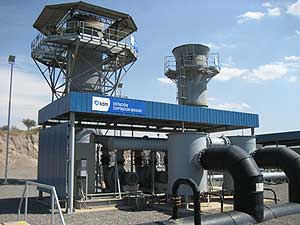 Flare station at the Loma Los Colorados Landfill near Santiago, Chile.
Flare station at the Loma Los Colorados Landfill near Santiago, Chile.
- In Partner Country Chile, a new KDM Energía LFG energy project
became operational earlier this year at Lomas Los Colorados Landfill near Santiago.
The $40 million USD project will create 15 MW to help supply local homes with energy.
International incentives helped to make the investments in projects such as this
more attractive. Under the Clean Development Mechanism of the Kyoto Protocol, KDM
Energía will receive greenhouse gas emission reduction credits that can be
sold to industrialized countries to offset their own emissions. Also, as a member
of the Organisation for Economic Co-operation and
Development (OECD)
 ,
an organization that promotes policies to improve the economic and social well-being
of people around the world, Chile committed to increase its environmental policies.
This has encouraged the development of renewable energy projects such as this LFG
energy project.
,
an organization that promotes policies to improve the economic and social well-being
of people around the world, Chile committed to increase its environmental policies.
This has encouraged the development of renewable energy projects such as this LFG
energy project.
Source: Blue Channel 24, "Pioneer Project Turns Chile's Landfill Gas into Energy,"
 29 July 2011.
29 July 2011.
In this edition:
- Partnership-Wide Meeting a Success!
- GMI Welcomes Two New Partner Countries
- 2011 Grant Solicitation Issued
- GMI Outreach
- Recent Developments and Resources
ASG Corner
Praise for Poland! Thank you to the Government of Poland for hosting a successful Partnership-wide meeting. We would also like to thank all the attendees and speakers for your participation and active engagement across sectors and countries. Each subcommittee reported progress, as well as important decisions from the Steering Committee. New connections and collaborations were forged, building upon our existing framework and strengthening the Initiative.
The Administrative Support Group (ASG) would also like to thank the meeting's main sponsor-Orlen-and the gold sponsors-Cedar Road Bioenergy, Inc.; Dart Energy; and Gaz-System-who helped make Poland an important Partnership event!
Sincerely,

Henry Ferland
Co-Director, ASG

Monica Shimamura
Co-Director, ASG